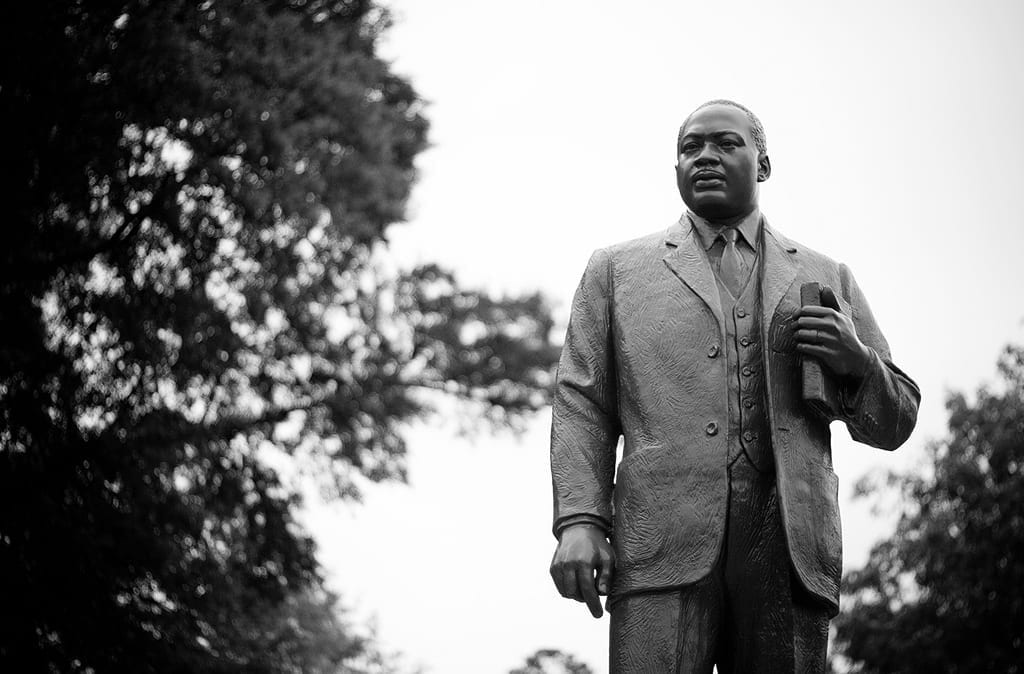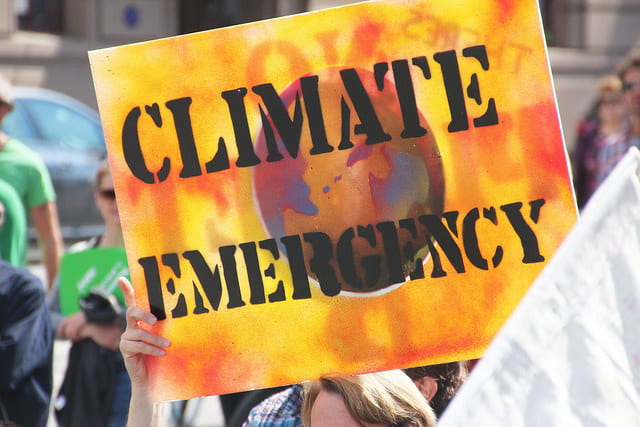
The Department of Anthropology and the College of Arts and Sciences at UAB initiated a brand new Master’s Program in the Anthropology of Peace and Human Rights this spring semester. The program begins with an initial cohort of nearly 20 students from Alabama and beyond, who are eager to study, understand, and ameliorate conflicts and injustice, from local communities up to the national and global levels. The new Master’s program complements the educational and outreach activities of the recently established Institute for Human Rights at UAB.
The history of the Civil Rights Movement in Birmingham constitutes one reason why the development of peace and human rights at UAB is historically and culturally important. The Anthropology of Peace and Human Rights program, with its educational purpose, can be seen as the one element among other positive developments in social justice and civil rights in Birmingham and Alabama over the last half century. The new program also takes a global focus.
Anthropology is the science committed to the comparative and historical study of humankind, looking across different cultural circumstances and into the depths of prehistory. Anthropology literally means the study of humanity and considers the interplay of biological and cultural factors. The new Master’s program in the Anthropology of Peace and Human Rights will introduce an innovative focus on peace, justice, human rights, and ecology, as considered from anthropological perspectives. The new program will address how factors such as ecological sustainability, human security, democracy, justice, non-violence, conflict resolution, and human rights are interconnected and related to peace in today’s interconnected world.
There certainly are no shortages of human rights challenges, conflicts, and violence in the world today, but as students will have a chance to explore in this new Master’s program, there also are viable solutions. To mention one aspect of cultural influences on conflict perceptions, a person’s view of humanity can affect thoughts on how best to seek justice and security. Culturally-based perceptions that human nature is naturally selfish, competitive, and aggressive can lead to fear of others, distrust, and a reluctance to cooperate. Such culturally-derived perceptions can also lead to pessimism about ending the institution of war or preventing particular wars. If human nature is nasty and aggressive, it follows that there may be only a slim chance of achieving a more peaceful and secure world. With such an orientation, it may seem sensible in seeking security to keep up one’s guard—“keep the powder dry”—and maintain suspicion about the intentions of others.
On the other hand, perceptions that humans can be cooperative as well as competitive, and peaceful as well as warlike, open the door to a different type of security strategy. As President Kennedy once suggested, “Every thoughtful citizen who despairs of war and wishes to bring peace, should begin by looking inward—by examining his own attitude toward the possibilities of peace.”
Perhaps the abolition of war could be possible and disputes could be handled justly without violence.
A goal of the new Master’s program is to explore questions: How we can handle our disputes more justly and effectively, with less violence? How can we question assumptions and challenge habitual thinking about war and peace to explore alternative security approaches?
In 2017, for instance, a solid argument can be made that strictly military-based strategies for security are no longer viable in an interdependent world facing common challenges. Military strength can do little-to-nothing, for example, to halt and reverse the numerous threats posed by global warming. The only manner to successfully address this planetary crisis, and to achieve security more generally, is through international cooperation. Military might does not address the problems we are now facing on an overheated planet.

Fortunately, international cooperation has been shown to be possible. The successful protection of the Earth’s ozone layer proves this point. In the late 1980s, the countries of the world negotiated and implemented the Montreal Protocol on Substances that Deplete the Ozone Layer and then have worked together to phase-out ozone destructive chemicals such as CFCs worldwide. Since the elimination of global CFCs and other ozone depleting substances, the Earth’s ozone layer has been replenishing. As of 2016, it is on the mend faster than predicted. In Science News published last week, Dr. Susan Solomon of MIT emphasizes that “public engagement was key to solving the ozone problem, with people coming together to identify an issue that threatened society and develop new technologies to fix it. In that respect, the most successful environmental treaty in history holds lessons for dealing with a much bigger threat…climate change.”
Global interdependence can provide the rationale for why cooperation is absolutely necessary to address common threats such as global warming and climate change. Safety and security in an interdependent world of 2017 require that humanity give-up the institution of war and instead concentrate our vision, resources, and ingenuity on solving the common threats such as climate change, loss of biodiversity, nuclear proliferation, and attacks on human rights and freedoms wherever they occur. The globally concerted and successful effort to save the Earth’s shared ozone layer demonstrates that an understanding of interdependence can lead to global cooperative action to solve common challenges. These are the types of anthropological lessons about conflict, rights, and justice that the new Master’s program will consider in depth.
Anthropology can contribute to understanding cultural diversity; reflection on cultural relativism; appreciation of multiculturalism; understanding of effective communication in cross-cultural interactions; knowledge regarding cultural variation in norms, values, beliefs, and culturally-embedded conflict resolution styles; and the development of respect for cultural differences and human rights. This unique knowledge-base and set of perspectives is at the heart of the innovative Master’s program’s focus on peace and human rights, which simultaneously contributes to the explicitly stated goals of the UAB College of Arts and Sciences to “enhance students’ global perspective” in an era where “globalization is diminishing the importance of national and political boundaries while increasing the opportunity for international harmony.”
The Department of Anthropology hosts the Peaceful Societies website, which provides a valuable educational resource on peaceful societies from around the globe. Anthropology faculty work regularly with students to help them pursue their academic interests and to develop the skills needed locally and globally in the 21st century.
Uniquely, the new Master’s program will combine and integrate the study of peace and human rights from an anthropological angle. It will draw upon the rich perspective of anthropology to highlight respect for diversity, multiculturalism, cultural relativism, and a comparative cross-cultural perspective. The new program also will focus both on theory and practice, thus facilitating the learning of theory and applications, a feature for which the discipline of applied anthropology is known. All Anthropology faculty members will teach from time-to-time within the Master’s program, and several professors are experts in relevant areas:
Dr. Loretta Cormier is one of the originators of the undergraduate minor Peace, Justice and Ecology. Her most recent book is Disasters and Vulnerable Populations (with Lisa Baker, Springer, 2015). In the new Master’s program, Dr. Cormier will teach electives such as “Medical Anthropology and Health Disparities.”
Dr. Douglas P. Fry specializes in peace and conflict studies. He is author of Beyond War (2007, Oxford), The Human Potential for Peace (2006, Oxford) and editor or coeditor of Keeping the Peace: Conflict Resolution and Peaceful Societies around the World (2004, Routledge), Cultural Variation in Conflict Resolution (1997, Erlbaum), and War, Peace and Human Nature (2013/2015, Oxford), and Associate Editor of the Encyclopedia of Violence, Peace, & Conflict (2008, 2nd edition, Academic Press). He will teach courses such as “Peaceful Societies and Peace Systems.”
Dr. Chris Kyle is a specialist in political violence in Mexico. He recently has received a prestigious Harry Frank Guggenheim research grant to study drug related violence in the Mexican state of Guerrero through innovative methodologies. He is currently writing a book on this topic. He will teach courses such as the “Anthropology of Human Rights.”
Dr. Tina Kempin Rueter is the Founding Director of the Institute for Human Rights at UAB. She holds a primary appointment in the Department of Government and a secondary appointment in the Department of Anthropology. Her research focuses on human rights, ethnic conflict and genocide studies, and conflict management and peacemaking with a geographical focus on Europe and the Middle East. She will teach various courses on human rights.
Dr. Geneviève Souillac is the author of Human Rights in Crisis (Rowman & Littlefield/Lexington Press, 2005), The Burden of Democracy: The Claims of Cultures, Public Culture, and Democratic Memory (Rowman & Littlefield/Lexington Press, 2011), and A Study in Transborder Ethics: Justice, Citizenship, Civility (Peter Lang, 2012) as well as numerous articles and book chapters. She will teach courses such as “Religion, Reconciliation, & Forgiveness” and “Conflict Resolution in a Cross-Cultural Perspective.”
Dr. Peter Verbeek specializes in studying conflict resolution and peacemaking in humans and other species and is the founder of the field of peace ethology. He is co-editor of Behavioral Processes and Systems of Peace (with Benjamin Peters, in press, John Wiley & sons). He will teach such courses as “Peace Ethology,” “Methods in Peace and Human Rights Research and Practice,” and “Peace and Environmental Sustainability.”

